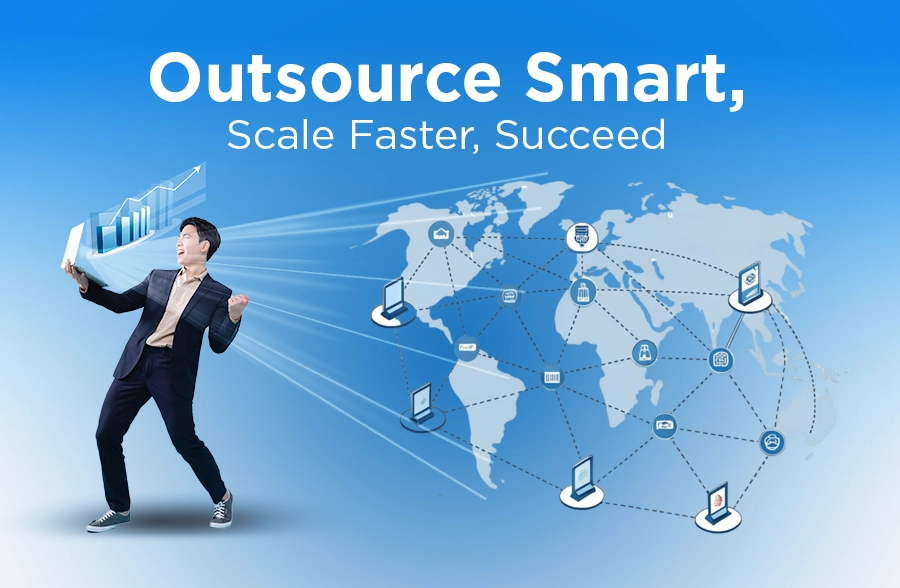Schedule a FREE call with our outsourcing expert now and get a precise quotation that meets your requirements. Don't wait - get started today!
As your business grows, integrating technology to automate processes becomes essential. The challenge arises if you find it difficult to provide technical support while managing core operations. You may have heard about technical support outsourcing as an option since hiring an in-house support team to handle technical support is associated with significant financial investment that may burden small and medium enterprises (SMEs).
When you hear outsourcing or partnering with a third-party service provider, you may think it’s costly, especially for start-up SMEs. However, research shows that 59% of companies outsource to lower operational costs. By delegating tech support services to outsourcing partners, your business can save costs in areas that would otherwise require internal resources and expenditures.
So, What Is Technical Support Outsourcing?
Technical support outsourcing allows your business to benefit from the expertise of a third-party provider that can help manage technical issues. This includes services troubleshooting software and hardware issues, guiding customers through installations, and handling any customer service inquiries related to technical matters.
Should You Outsource Tech Support?
Outsourcing technical support is a significant business venture for SMEs. It can deliver potential benefits but doesn’t always translate into the desired outcomes if not implemented properly. To ensure that outsourcing is a worthwhile decision, here are three areas that must be considered:
A. Understanding Your Business Needs
The first step is identifying and understanding what your business needs, which serves as a guide in making the right decision. Ask these questions:
- What kind of technical support does my business need?
- What do my customers need specifically?
- What are my long-term business goals?
Understanding your unique needs will help you decide if technical support outsourcing is the right move for your thriving business.
B. Evaluating Your Internal Abilities
Next, you need to assess your in-house team’s capabilities honestly. Consider their strengths and weaknesses and whether they can upskill to support your tech support needs. If your team is already overworked or lacks the necessary skills, hiring outside help could be a solution.
Remember, the goal is not to replace your in-house team but to support their efforts, allowing them to focus on their main areas of expertise.
C. Considering the Advantages and Disadvantages
Finally, consider the pros and cons of hiring outside tech support.
The advantages can include:
- Increased Efficiency. Hiring outside help can free your team to focus on core business tasks.
- Cost Savings. You save on training and maintaining an in-house tech support team.
- Access to Global Talent. Outsourcing opens doors to a broader range of skilled technical professionals worldwide. This allows you to find the perfect fit for your needs, regardless of location.
However, it’s also essential to note the potential downsides, such as the perceived loss of control over your tech support.
Deciding whether to hire outside tech support is a big decision, but by understanding your business needs, evaluating internal abilities, and considering the advantages and disadvantages, you’ll be well-equipped to make the right choice.
Top Reasons for Outsourcing Technical Support
SMEs are increasingly turning to outsourcing technical support services to cater to the demands of technical support in growing business external providers, which is a smart move to enhance operational efficiency. The top reasons driving this trend include:
- Cost Optimization. Reduce overhead associated with hiring, training, and managing an in-house technical support team.
- 24/7 Availability. Ensure uninterrupted customer service with providers offering around-the-clock operations that exceed your in-house capacity.
- Access to a Talent Pool. Tap into a wider pool of highly skilled and experienced technicians, eliminating the limitations of local recruitment.
- Enhanced Expertise. Benefit from specialists with diverse skill sets, allowing them to efficiently tackle even the most intricate technical issues.
- Advanced Infrastructure and Resources. Gain access to state-of-the-art technology and facilities that your in-house team might not possess.
- Scalability and Flexibility. Effortlessly adapt your technical support capacity to fluctuating customer demands, avoiding the need for constant team restructuring.
- Improved Customer Satisfaction. Deliver faster issue resolution and a more positive customer experience by leveraging expert problem-solving skills.
- Focus on Core Business. Free up your internal resources from technical support responsibilities, allowing them to concentrate on strategic business initiatives.
By outsourcing technical support, you benefit from operational efficiency, enhanced customer satisfaction, and, ultimately, stronger business growth.
How To Get Started With Outsourcing Technical Support
Now that you’ve assessed your business needs and weighed the technical support outsourcing pros and cons, it’s time to ensure a smooth transition by following this step-by-step guide:
Step 1. Understand the Types of Outsourcing
When outsourcing technical support, there are three main options. Your choice will depend on your preference, the availability of the outsourcing partner, and your budget.
- Domestic (Onshore) – This means partnering with a company located in your country. This can be helpful for cultural and time zone reasons.
- Neighboring Country (Nearshore) – Partnering with a company in a nearby country can offer similar time zone benefits and potentially lower costs than domestic options.
- Overseas (Offshore) – This involves outsourcing to a company in another part of the world. This option often has the lowest costs, but time zone differences need careful planning.
Step 2. Start Looking for an Outsourcing Company
After deciding on your outsourcing partner’s geographic location, it’s time to look for an outsourcing company. Consider these factors:
- Reputation – When evaluating an outsourcing partner, thoroughly research their reputation in the industry. Look for accreditations, certifications, awards, and customer testimonials or reviews that validate their credibility and quality of service.
- Experience – Make sure they have a solid track record in technical support. Their experience is usually proven through their years of operating and providing outsourcing services.
- Expertise – Opt for an outsourcing partner that specializes in your specific industry or has extensive expertise in handling the technical challenges and requirements unique to your business.
- Team Skills – Ensure their staff is qualified and experienced in handling similar technical issues.
- Resources -Evaluate the outsourcing provider’s access to updated technology, tools, and resources required for efficient technical support operations. They should be able to utilize cutting-edge solutions to provide high-quality support.
- Flexibility – Choose an outsourcing partner that can adapt to your growth and scale their services up or down as per your requirements. They should be able to grow along with your company’s evolving technical support demands.
- Pricing – Thoroughly evaluate the pricing structures and service packages offered by different outsourcing providers. Conduct a cost-benefit analysis to find the most suitable option that aligns with your budget while delivering the desired quality of service.
Step 4. Create a Service-level Agreement
Once you’ve chosen your BPO partner, it’s time to set clear goals. This agreement will outline how you’ll measure success.
“Key Performance Indicators (KPIs) such as First Call Resolution (FCR) and Average Handle Time (AHT) are critical in measuring the effectiveness of our technical support team,” said Fred Chua, CEO of Magellan Solutions. “Our goal is to resolve issues promptly and efficiently, minimizing the need for follow-up calls and ensuring customer satisfaction. Service Level Agreements (SLAs) also play a crucial role in setting clear expectations for response times and issue resolution.”
By setting clear expectations through a comprehensive Service Level Agreement, both parties have a well-defined framework for measuring the success of the outsourced technical support operation and ensuring service delivery meets the desired standards.
Step 5. Preparing for a Smooth Transition
Planning is key! Think about what needs to be in place for a seamless switch to outsourced support. This may include:
- Clearly defined business objectives for the outsourced service.
- Key metrics to track performance.
- Training for your internal team on the new workflow.
- Ensuring the BPO provider has access to your necessary technology and infrastructure.
Step 6. Maintain Constant Communication and Collaboration
Your partnership with your outsourced technical support provider doesn’t end after the initial launch and implementation phase. Regular communication is essential for long-term success.
Continuously monitor performance, provide feedback, and collaborate to make adjustments that optimize service delivery. A strong, open partnership fosters effective problem-solving, strategic alignment, and a high-quality technical support experience.
Take Advantage of Magellan Solutions Expertise As Your Reliable Technical Support Outsourcing Partner
For over 18 years, Magellan Solutions has been offering quality yet affordable technical support outsourcing services. We have a pool of highly trained and talented professionals with the expertise to navigate even the most complex technical challenges. Our friendly service and straightforward solutions are tailored for SMEs thriving for growth.
Don’t struggle with tech issues alone. Turn to Magellan Solutions for reliable, easy-to-understand support. Contact us now to learn how our hassle-free technical support can keep your business running smoothly.
















